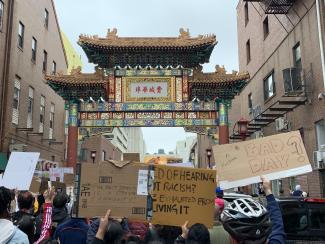
Philly Rally for Solidarity 3/25 reflections by Rob Buscher
For the first time after the deadly Atlanta shootings I breathed a breath of collective release alongside hundreds of anti-racism activists who took the streets of Philadelphia during the Philly Rally for Solidarity that took place on Thursday, March 25. Starting with remarks from Pan-Asian and multiethnic activists, community leaders, and elected officials at the Vine Street Plaza, we marched through Chinatown and down Market Street to City Hall. Our Asian American community turned out in force with great energy and resolve. In the decade-plus that I have been organizing in Philly’s Pan-Asian American space, this was by far the largest turnout of AAPIs I have seen at a protest.
Looking around the crowd, my heart was full as I saw the true diversity of our city represented among our allies from the Black, Latinx, Middle Eastern, Muslim, Jewish, and white communities showing up to support our message to end institutional white supremacy and stop anti-Asian hate through an intersectional approach, and in solidarity with other marginalized peoples.
Organized by a group of individuals unaffiliated with any existing AAPI advocacy organizations, this was an expression of grassroots activism in its truest form. Similar to the Movement for Black Lives, this signals an exciting development in decentralized leadership in Asian American organizing as the broader community engages in the urgent issue of combatting anti-Asian violence.
In my course on Asian American Activism, I often debate with my students whether activists truly speak for the will of the communities they represent. Although they are generally acting with the community’s best interest at heart, my feeling is that most activists typically represent the vanguard of progressive (and in some cases conservative) viewpoints. There is often a lag between the activist perspective and that of the general community who may be less familiar with a particular issue and therefore lack a strong opinion.
The emergence of a broad-based Asian American grassroots campaign made up of individuals who have not previously participated in activism is an exciting prospect. Although some may go no further than attending a single rally or march, for others this may be the entry point into longer-term organizing.
Issues like institutional white supremacy, anti-Blackness, internalized racism, intergenerational trauma, hyper-sexualization of Asian women, and so many others that our communities face will not be solved quickly. These are deep-seated issues that date back to the birth of our nation and are still at the rotten core of the United States as an institution. Activists have been working to uproot these foundational issues for generations, with frustratingly little progress. Many of these newfound activists will not be willing to commit to the long haul. That said, there is no single person or organization who owns activism. We can all be activists in our own way to the extent we are able. Successful movements are built by a diversity of voices and spectrum of beliefs, pushing different pressure points through techniques they are uniquely enabled to do so.
The anti-Asian climate of hate is far from over, and we have much more work to do in continuing to build solidarity with other BIPOC communities in the quest for our collective liberation, but the March 25 Rally gave me hope for the first time in a long while. Many of my elders in the Asian American activist community are saying this moment feels different somehow. I hope they are right.
